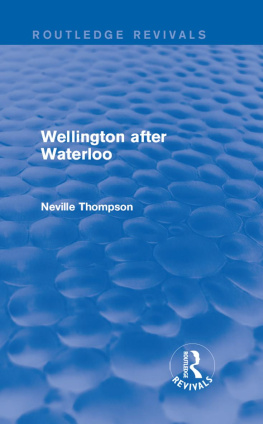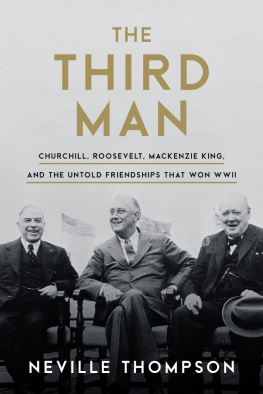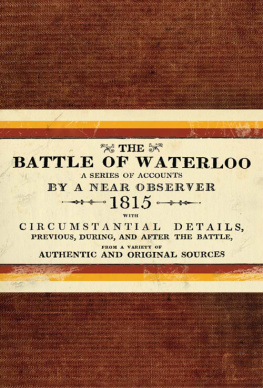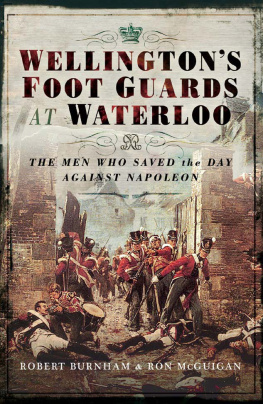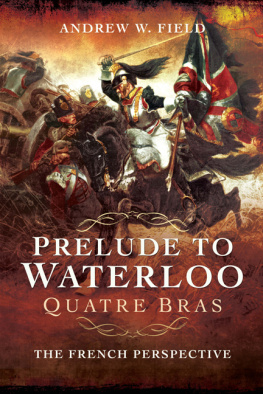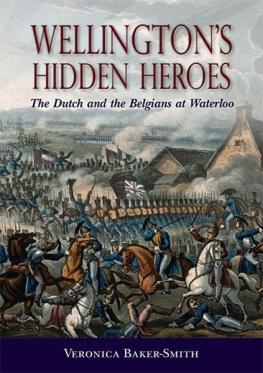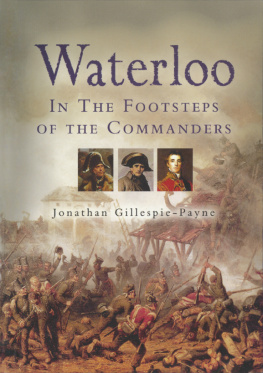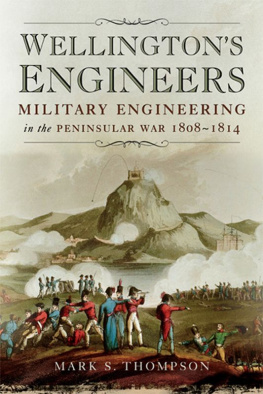Routledge Revivals
Wellington after Waterloo
First published in 1986. In this book Neville Thompson traces Wellingtons life after 1815 using then new archival and documentary records. The work examines the development of Wellingtons character and outlook, and assesses the significance of his persistent involvement in politics over three decades. It shows the Duke was a crucial figure in the development of the compromise between reform and the preservation of traditional institutions and practices. This title will be of interest to students of history.
Wellington after Waterloo
Neville Thompson
First published in 1986
by Routledge & Kegan Paul
This edition first published in 2016 by Routledge
2 Park Square, Milton Park, Abingdon, Oxon, OX14 4RN
and by Routledge
711 Third Avenue, New York, NY 10017
Routledge is an imprint of the Taylor & Francis Group, an informa business
1986 Neville Thompson
All rights reserved. No part of this book may be reprinted or reproduced or utilised in any form or by any electronic, mechanical, or other means, now known or hereafter invented, including photocopying and recording, or in any information storage or retrieval system, without permission in writing from the publishers.
Publishers Note
The publisher has gone to great lengths to ensure the quality of this reprint but points out that some imperfections in the original copies may be apparent.
Disclaimer
The publisher has made every effort to trace copyright holders and welcomes correspondence from those they have been unable to contact.
A Library of Congress record exists under LC control number: 86000504
ISBN 13: 978-1-138-63867-9 (hbk)
ISBN 13: 978-1-315-63766-2 (ebk)
WELLINGTON

AFTER

WATERLOO
NEVILLE THOMPSON
First published in 1986 by
Routledge & Kegan Paul Ltd
11 New Fetter Lane, London EC4P 4EE
Published in the USA by
Routledge & Kegan Paul Inc.
in association with Methuen Inc.
29 West 35th Street, New York, NY 10001
Set in 10 on 12 point Bembo
by Witwell Ltd, Liverpool
and printed in Great Britain
by T J Press (Padstow) Ltd
Padstow, Cornwall
Copyright Neville Thompson 1986
No part of this book may be reproduced in any form without permission from the publisher except for the quotation of brief passages in criticism
Library of Congress Cataloging in Publication Data
Thompson Neville.
Wellington after Waterloo.
Bibliography: p.
Includes index.
1. Wellington, Arthur Wellesley, Duke of, 17691852.
2. StatesmenGreat BritainBiography. I. Title.
DA68.12.W4T4 1986 941.070924[B] 86504
British Library CIP Data also available
ISBN 0710207476
For my daughter
Elizabeth Anne Pidgeon
on her birthday
Great men are the guide-posts and landmarks in the state.
Edmund Burke, Speech on American Taxation, 1774
I IS A pleasure to record my thanks to the many individuals and institutions whose assistance was essential to this book. My first thanks must be to my wife Gail, who endured with patience the long periods in which the events of the early nineteenth century seemed more immediate and pressing than those of the present, and bore with good humour my affliction not only with the Duke of Wellingtons ailments but also his less appealing mannerisms. The writing of this preface coincided with the happy event commemorated in the dedication.
I am grateful to my colleague William Stockdale and my old friend Kenneth Lockridge of the University of Michigan who read the penultimate draft of the manuscript with close attention and friendly critical eyes. I am solely responsible for not accepting all their generous suggestions for improvement. In this as in much else Horatio Lovat Dickson, author, editor, publisher and man of letters, has been a source of inspiration and encouragement.
The archival research was made possible by grants from the Social Sciences and Humanities Research Council of Canada. Grants from McMaster University and the University of Western Ontario assisted in assembling published material. I was greatly helped by the librarians of both universities. The many drafts of the manuscript were typed by my former secretary Carmen Callon, my present secretary Christianne Speed, and by other secretaries of the History Department, particularly Jeanette Berry and Lori Morris.
Apart from the archival sources, this book is based on a steady stream of published material which began well before the end of the Duke of Wellingtons life. Two recent books deserve special mention. The first is the magnificent volume of Wellingtons political correspondence for 1833 and 1834 edited by John Brooke and Julia Gandy (1975) to the highest unobtrusive standards of modern scholarship; everyone interested in the Duke and early nineteenth century politics must hope that the remaining volumes will not be long in appearing. The second is Elizabeth Longfords biography of Wellington, the second volume of which (1972) was the first to break the ground of the Dukes career after Waterloo. It will be immediately obvious that my view of the man, of the events of the period and the relation between them is not hers, but in the case of so towering a figure as Wellington appreciation may take many forms.
By gracious permission of Her Majesty the Queen I was allowed to study and quote material pertaining to the Duke of Wellington in the Royal Archives at Windsor Castle. Sir Robert Mackworth-Young, the former Librarian, and Miss Jane Langton, the Registrar, were most helpful in assembling this material for me.
I am deeply grateful to the Duke of Wellington and his father, the seventh Duke, who permitted me to use the Wellington Papers formerly at Apsley House (now Crown copyright material, in the University of Southampton Library, and reproduced by kind permission of the Public Record Office). When I read them, the papers were at the Historical Manuscripts Commission and I recall with much pleasure the facilities made available to me and the unfailing help of the staff of the Commission and the National Register of Archives.
I am grateful to the Earl Bathurst for permission to quote material from the Bathurst Papers on loan to the British Library; and to the librarians and archivists of the following institutions and other copyright holders for their assistance and permission to reproduce unpublished material: the British Library; the Public Record Office; the Surrey Record Office and the Hon. James Leslie Hamilton; the Durham Record Office and the Marquess of Londonderry; and the Sheffield City Libraries, the Director of Libraries and Information Services and the Earl of Wharncliffe.
For permission to quote published material I am grateful to the following copyright holders: Her Majestys Stationery Office; Cambridge University Press; David Higham Associates Ltd; Hodder and Stoughton Ltd; Macmillan Publishers Ltd; John Murray (Publishers) Ltd; and the Royal Historical Society.

 AFTER
AFTER 


